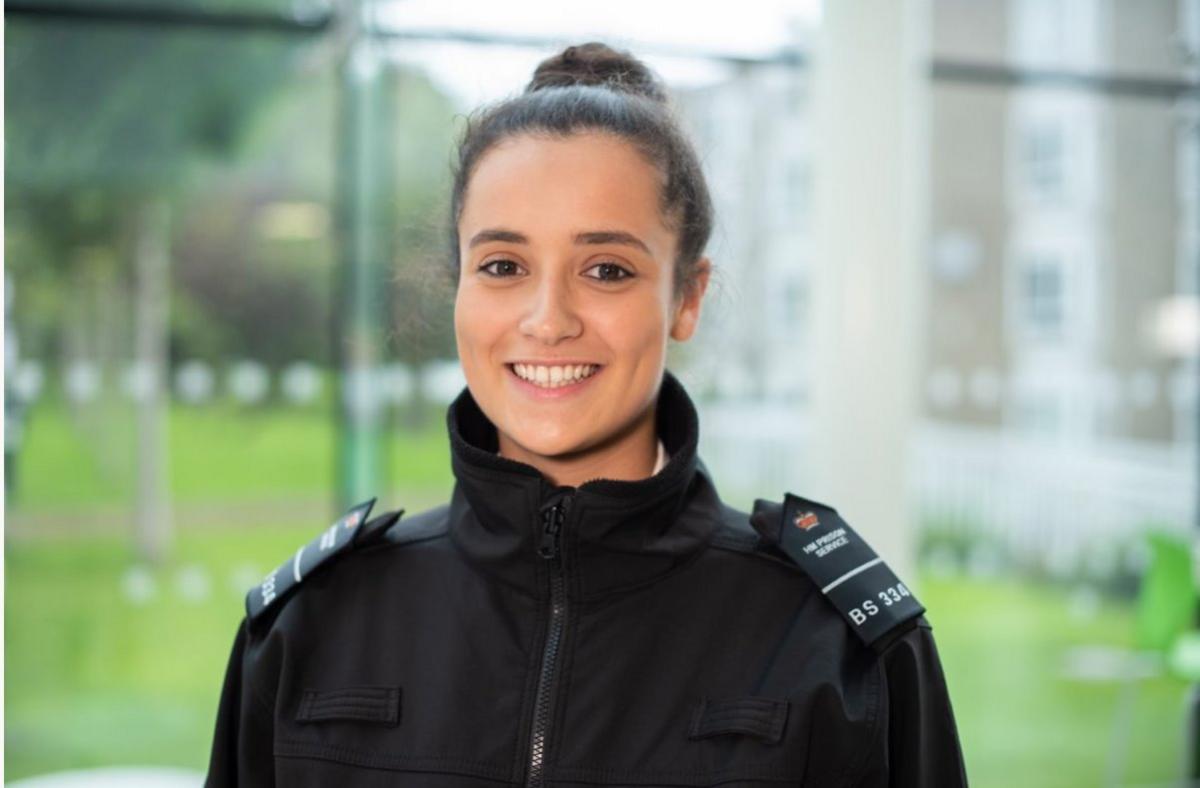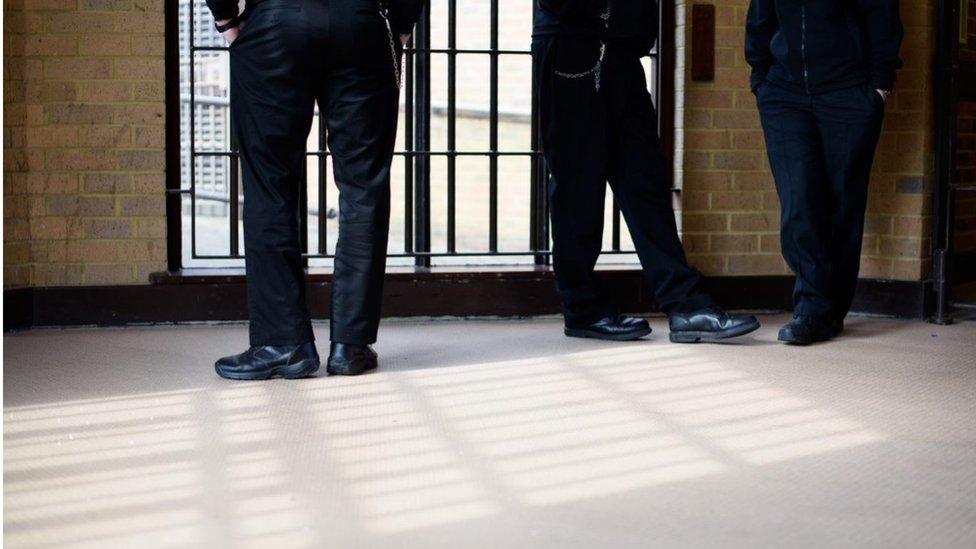Why I quit an accountancy career to be a prison officer
- Published

If you're looking for a job, there are plenty in prisons, according to recent figures, with almost 1,000 prison officer positions on offer in the UK at the end of November. But with a record number of officers leaving, according to their union, who will fill these roles?
"We consider ourselves to be the forgotten public service," says Mark Fairhurst, national chairman of the Prison Officers' Association.
He blames violent working environments and pay that has not kept pace, for the high number of vacancies.
So why would you give up a comfortable, potentially high-earning career as an accountant, a year from the end of your training, for a prison officer's uniform and boots?
"I think it's safe to say my mum was not impressed," says 25-year-old Caprice Roberts of the moment she told her family her plans.
"She thought I was giving up a massive opportunity, which I guess in most people's eyes, I have, but I knew exactly what I wanted to do."
'Genuinely helping'
At school, Caprice excelled at maths and at 18 embarked on a five-year degree apprenticeship in accountancy with a top firm.
But after four years, having passed professional exams and completed a University of Birmingham degree, she did not believe accountancy "was going to keep getting me out of bed in the morning".
"In prison, every day, I feel like I'm genuinely helping someone."
During her accountancy training, Caprice volunteered for a charity, helping disadvantaged young people dress smartly for job interviews.
One young man, who had no proper shoes for his interview, said he had spent time in jail. His story stuck in her mind and she began researching prisons and offender rehabilitation.
Caprice is now on the Unlocked Graduates programme, which combines a master's degree with prison officer training, focused on rehabilitation. It was the fully-funded master's that helped convince her family.
After six weeks intensive training, Caprice walked on to the landings for the first time 15 months ago, at Brinsford Category C Young Offender Institution, near Wolverhampton.

Her family feared for her safety: "I guess probably because of what everyone perceives prisons to be, which is fight after fight, weapons, assaults, staff getting hit left, right and centre.
"That's what you see on TV, isn't it?"
Makeshift weapon
She admits she came close to being assaulted during a fight between prisoners, which she and other officers broke up.
Afterwards, they found one prisoner had a makeshift weapon, made out of tins.
"In the actual incident I don't think I was that scared. I had no idea that my safety was in danger until afterwards and that's just stuck in my mind ever since.
"You're not sure who's going to come out with a weapon, and it might not even be for you.
"After a while you get this sort of sixth sense, because you know your lads, you know when something's a bit off."
In August, an unannounced inspection at Brinsford, external found levels of assaults between inmates were higher than for similar institutions, but praised innovative efforts to support challenging or vulnerable prisoners.
De-escalation
Unlocked has recruited just over 500 new prison officers since it started in 2017.
Last year, there were 24 applicants for each place and one in six of the new recruits was, like Caprice, quitting another career.
The recruitment process assesses applicants' resourcefulness and emotional intelligence.
"It's quite easy, to a certain extent, to de-escalate a situation, just using five-minute interventions of standing talking to the lad and getting him to calm down, understanding what's going on," says Caprice.
"I think once you've got empathy, you've got half the battle done."

If they stay in the job, Unlocked recruits will learn to cope with all the difficulties and dangers of a prison officer on the job, says Mr Fairhurst.
"We welcome any scheme that puts boots on the landings."
But he is concerned that, overall, most of the officers who quit, do so in the first couple of years.
They find they can earn more in the police, the border force, the railways or the NHS, he says, arguing for a total overhaul of the pay structure.
Caprice says her preconceptions from films were that most prison officers "would be a bit mean".
But, after starting, she found: "They're just nothing like that. Every member of staff has so much respect for the prisoners, and the prisoners, as a result, have respect for the staff."
Offenders in prisons like Brinsford tend not to be there for very long, so the challenge for officers is to get to know them.
Caprice's high points have been getting young men, who may have been in and out of prison several times, to engage with the system: "To know them well enough to signpost them to the right areas, to hopefully reduce their reoffending."
Low points are when someone she thought was well set to cope outside is released but reappears.
"And you're thinking: 'But you hate it in here, so why are you back?'.
"That's the most frustrating thing, because you know they don't want to be here, we don't want them to be wasting their life here. And yet within days, sometimes even hours..."
'It beats spreadsheets'
If all goes to plan, Caprice will complete her master's in applied custodial leadership at Leeds Trinity University next September.
Her cohort of trainee accountants finished their course in July.
She says she has the best stories about her working day when she meets former colleagues in the pub. "It beats spreadsheets," she says.
"They don't believe most of the stories because it's just so far-fetched from the life they're now living, which is the one I was living before."
In the last week of November 2021, there were 987 active adverts for prison officer jobs in the UK, according to the most recent analysis from the Recruitment and Employment Confederation in partnership with Emsi .